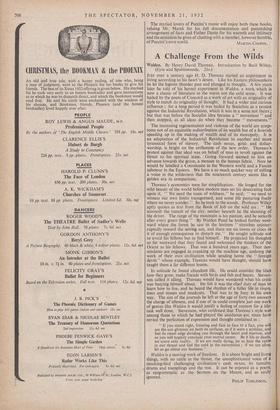A Challenge From the Wilds
Walden. By Henry David Thoreau. Introduction by Basil. Willey. (Eyre and Spottiswoode. 21s.)
JUST over a century ago H. D. Thoreau started an experiment in living according to his heart's desire. Like his Eastern philosophers he let the legions thunder past and plunged in thought. A few years later he told of his hermit experiment in Walden, a work which is now a classic of literature in the warm not the cold sense. It was hailed by the poets of Concord as a work of art with an originality of style to match its originality of thought. It had a wider and curious influence ; for a long period it was hailed by Socialists as a protest against the Industrial Revolution, which it was in a sense not theirs ; but that was before the Socialist idea became a " movement " and then stopped, as all ideas do when they become " movements."
The increasing regimentation and violence of the world are symp- toms not of an equitable redistribution of its wealth but of a feverish speeding up in the making of wealth and of its monopoly. It is an adaptation of the Industrial Revolution to another and more tyrannical form of slavery. The cash nexus, gold- and dollar- worship, is bright on the oriflamme of the new order. Thoreau's protest against that ideal was on behalf of man in revolt against the threat to his spiritual state. Going forward seemed to him an advance towards the grave, a menace to the human fabric. Now he would be labelled a Communist in the Western world and a Fascist saboteur in the Eastern. We have a so much quicker way of stilling a voice in the wilderness that the nineteenth century seems like a golden era in comparison.
Thoreau's economics were for simplification. He longed for the wild beauty of the world before modern man set his desecrating foot upon it. " We need the tonic of wildness," he said; " we need to witness our own limits transgressed, and some life pasturing freely where we never wander." So he took to the woods. Professor Willey aptly quotes as text from the Book of Job on the wild ass : " He scorneth the tumult of the city, neither heareth he the shouting of the driver. The range of the mountain is his pasture, and he seeketh after every green thing." By Walden Pond he looked further west- ward where the forest he saw in the horizon " stretches uninter- ruptedly toward the setting sun, and there are no towns or cities in it of enough consequence to disturb me." He sought solitude not to avoid his fellows but to find himself. He projected his thoughts so far westward that they found and welcomed the thinkers of the Orient as his fellows. That was a hundred years ago. Their des- cendants are engaged insranking up the machine age, undoing the work of their own civilisation while sending home the " foreign devils" whose example, Thoreau would have thought, should have taught them a far different lesson.
In solitude he found abundant life. He could consider the lilies how they grow, make friends with birds and fish and beasts. Steven- son called it idling. Thoreau would have wondered what his critic was busying himself about. He felt it was the chief duty of man to learn how to live, and he heard the rhythm of a fuller life in rivers, trees and stones and muskrats. That was to be busy in his own way. The size of the journals he left at the age of forty-two answers the charge of idleness, and if one of us could complete just one work of genius like Walden it would justify a feeling of content for a life- task well done. Stevenson, who confessed that Thoreau's style was among those to which he had played the assiduous ass, must have envied the perfection of expression and thought contained in : " If you stand right, fronting and face to face to a fact, you will see the sun glimmer on both its surfaces, as if it were a scimitar, and feel its sweet edge dividing you through the heart and marrow, and so you will happily conclude your mortal career. Be it life or death, we crave only reality. If we are really dying, let us hear the rattle in our throat and feel the cold in the extremities ; if we are alive, let us go about our business."
Walden is a moving work of freedom. It is about bright and living things, with no rattle in the throat, the unsophisticated voice of a mocking-bird challenging civilisation's cash nexus, its tumults, r. drums and tramplings and the rest. , It can be enjoyed as a poem,
as epigrammatic as the Sermon on the Mount, and as easily ignored.
PHILIP TOMLINSON.










































































 Previous page
Previous page